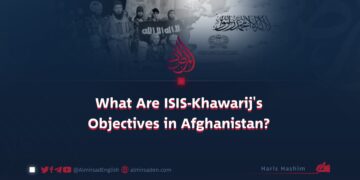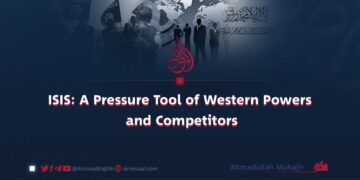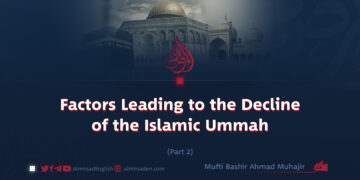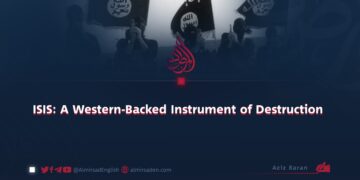Author: Zul-Kifl Zaki
Allah Almighty has promised us victory, while America has promised us defeat. Let us witness which promise comes to fruition.
The young Muhammad Omar had recently laid down the rocket launcher from his shoulders; the wounds from his victorious battles against the Soviet Union remained clearly visible on his person. The profound emotions and visionary insight of this orphaned youth once again drew him toward his scattered books. He had barely completed a few pages when the dark clouds of the Red Menace once again cast their shadow over the liberated land.
The claimants of the victorious war—those who had fought against communist ideologies and were renowned for their memories of jihad and sacrifice—quickly became victims of their own desires and arrogance, turning against one another. The foundational objective—the establishment of a comprehensive Islamic system—was reduced to mere rhetoric, while the blood of one and a half million martyrs was weighed in the scales of betrayal. Oppression, brutality, looting, plunder, and violation of rights pervaded, endangering the security of the entire nation. No life, honor, or property remained secure.
This turmoil struck a deep chord in the conscience of Mullah Muhammad Omar Mujahid. He envisioned a path of salvation for his nation—a path grounded in divine guidance and Islamic justice. Thus, from a small group of sincere men, he laid the foundation of a movement that would grow, by the will of Allah, into a formidable force: the Islamic Emirate of Afghanistan (IEA). Through it, the land was rescued from warlords and chaos, and for the first time in decades, security and justice reigned.
The Western world and global infidels—primarily led by America—were resolute in preventing the establishment of an Islamic system that could challenge their interests, embody true Islam, expose the reality of democracy and secularism, and serve as an inspiration for the rest of the Islamic world. They feared that such a system would pave the way for a unified leadership and a caliphate stretching from Morocco to Indonesia and India.
It was under the pretext of September 11 that the contemporary Pharaoh, Bush, sought to invade Afghanistan, dubbing this conflict the ninth Crusade.
Thalith Omar, together with his brothers who had arrived from far-flung lands to aid in the resistance against the Soviet invasion, relinquished the comforts of life in the Arabian Peninsula—abandoning wives, parents, and children—to embrace the hardships of jihad. He did not forget the favors they had extended. He offered protection and brotherhood, even at the cost of his own kingdom, to a guest who had shattered the idols of the age.
Following the invasion of our sacred soil by the Crusader coalition under American leadership, a dark veil of occupation descended upon us. A new era of oppression and savagery was ushered in, targeting the dignified Afghan populace. The pitiless aggressors, akin to ravenous wolves, preyed upon the Afghan nation. Their profound animosity toward mosques, scholars, and schools escalated with each assault. Night raids and the deafening sounds of aircraft transformed the hopes and dreams of Afghan men, women, elders, and children into nightmares. Every morning in the villages, grief and despondency reigned.
Amidst the occupation, Omar’s forces began to regroup and execute coordinated actions of resistance. Youth, impassioned by divine love, joined the ranks of the Istishhadi Mujahideen. The country metamorphosed into a blazing furnace for the occupiers. The thunderous detonation of explosive devices, in mere moments, nullified the advancements of modern technology. The celestial sounds of Istishhad and vehicular explosives disrupted the serenity of the Crusader forces ensconced behind fortifications of steel and concrete. Each bullet from the retaliatory forces claimed the life of an invader. Through urban warfare, the infiltrators transformed the invaders’ reveries into nightmares.
In this course of events, Thalith Omar departed to meet his Lord. Yet he left behind a unified leadership and a battle-hardened army—steadfast in both faith and strategy.
For two decades, a fierce struggle between truth and falsehood raged, astounding the world. America, in alliance with NATO, unleashed its full arsenal, converting Afghanistan into a battlefield. However, it was the very Talib and Mujahid, nurtured under the guidance of Thalith Omar (may Allah have mercy on him), who—despite being deprived of the privilege of continued existence on Earth—compelled the haughty world to engage in eighteen months of negotiations. This marked the first instance in American history where protracted discussions were conducted with a single entity.
Allah Almighty dispatched His angels of succor, initiating a series of conquests. Initially, vast regions and territories fell under the sway of the Mujahideen. The conflict advanced to urban centers, resulting in the rapid capture of provinces one after the other—a feat previously deemed unattainable by human standards. Thus, the manifest and unequivocal triumph bestowed by the Lord was fulfilled.
Our homeland was liberated. The armies of Islam entered Kabul, while the tyrannical forces fled to the shelter of their masters. And thus, the promise of Allah was fulfilled, and the prophecy of Thalith Omar (may Allah have mercy on him) realized.
Thalith Omar (may Allah have mercy on him) was not merely a military leader; he was a mercy upon the Ummah. Born into hardship, raised amidst tribulation, and taken from this world during a time of great trial, he embodied the prophetic tradition of steadfast resistance. Through his hands, Allah humbled a global superpower and revived within the Muslim world the long-forgotten concepts of sovereignty, Shari’ah, and Islamic governance.
The entirety of Thalith Omar’s life was a narrative of dignity; his jihad, a timeless exemplar of valor. His struggle, perseverance, selflessness, migrations, leadership, and even his departure—each was a testament to honor. At a training camp, an Arab instructor once urged his Mujahideen: “Adopt the faith and conviction akin to that of Mullah Muhammad Omar Mujahid (may Allah have mercy on him).”
In the tumult of America’s invasion of Afghanistan, as the nation teetered on the verge of collapse, the Mujahideen were in retreat, conceding Kandahar and other strategic positions. Every city and village in Afghanistan faced incessant bombardment. Scores of Mujahideen lay in pools of their own blood. The deafening roar of B-52 bombers resonated through the skies.
Yet, amidst that darkest hour, Thalith Omar (may Allah have mercy on him) assured his combatants of divine aid and ultimate victory.
Indeed, Thalith Omar was the reviver of the 21st century and the luminous mark of dignity on the forehead of this Ummah.



















































